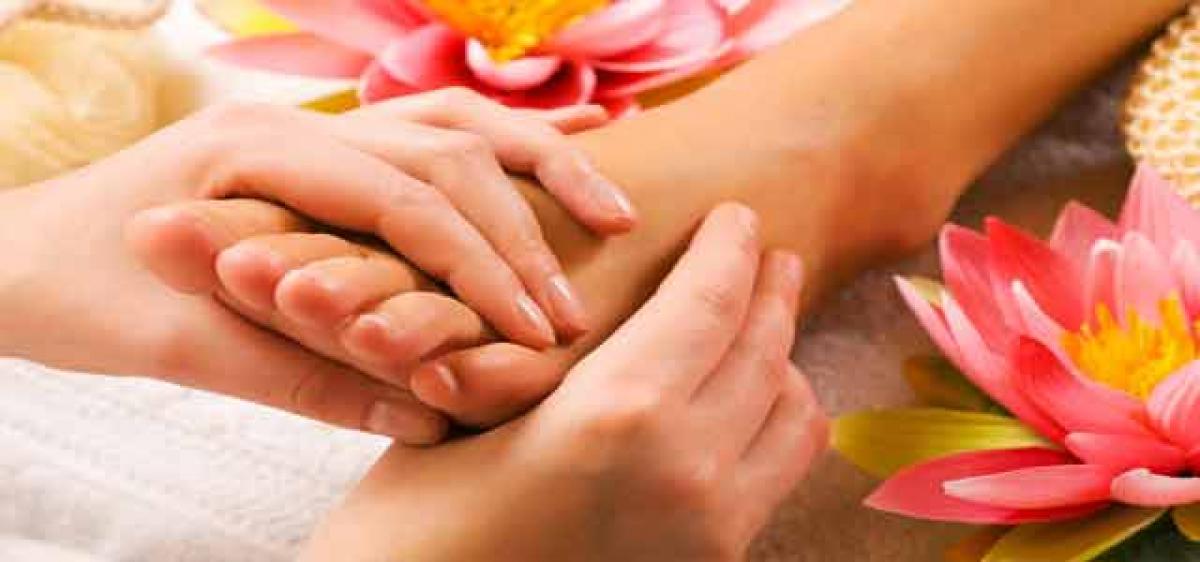Feet care regimen as important as face care

Ignoring the feet can have painful consequences including bacterial or fungal infections, corns, cracked skin, bad odour, among others. A simple ritual of scrubbing your feet, keeping them dry and wearing the right shoes can eliminate these problems, says an expert.
Ignoring the feet can have painful consequences including bacterial or fungal infections, corns, cracked skin, bad odour, among others. A simple ritual of scrubbing your feet, keeping them dry and wearing the right shoes can eliminate these problems, says an expert.
Sapna V Roshni, Plastic and Reconstructive Surgeon at Cocoona Centre for Aesthetic Transformation, has doled out a few pointers that could be followed:
Washing feet well
Feet skin is the most susceptible to bacterial and fungal infections since it is cloaked in socks and shoes for a major part of the day, and is also exposed to the dust and grime of the floor.
The skin between the toes is a perfect place for bacterial and fungal infections to flourish if it is not washed and cleansed properly. It is, therefore, very important to soap and wash your feet once every day to ensure that the locked in dirt and sweat is cleansed.
Keeping them dry
Athlete's foot is a common fungal infection of the feet which causes itching, burning, peeling of the skin, and in some cases may also cause painful blisters. Dampness is a perfect environment for fungal infections like athlete's foot to thrive.
Drying the feet, especially the area between the toes is very essential after every wash, especially if you are wearing socks and shoes immediately afterwards.
Moisturising them regularly
Don't limit your moisturising routine to just your face and hands. Lack of moisture can leave your feet skin dry, scaly and chapped. The chapped skin can then become extremely dry and hard especially on the heels.
This area can then become a magnet for dirt and grime which will start sticking to it. Chapped heals do not just have an unseemly appearance but can also be painful. Make sure you apply a generous dose of moisturizing agent on your feet every day after washing your feet. Cocoa butter or petroleum jelly can be good options.
Removing jagged skin
Moisturising dead skin will not serve any purpose. It is important to remove the dead layer first by exfoliation once every month. This can be done with pumice stones or loofas, but mildly.
It also helps remove the dirt and grime stuck to the hardened dead skin. Follow it with a hydrating moisturiser and leave it overnight. Scrubbing can also be done with the mixture of sugar and olive oil with a few drops of mint or tea tree oil added to it for anti bacterial properties.
Pampering them occasionally
Leave your feet soaked in warm water for 10 to 15 minutes twice a month. This helps soften the skin. Then rub the feet mildly, dry them thoroughly and apply a vitamin-e -rich cold cream. If your feet are susceptible to infections and inflammations, use an anti bacterial cream.
You can also use a mashed banana mixed with lemon juice as a hydrating mask. Apply it all over your feet and wash it with warm water after 20 minutes.
Apply moisturising foot cream or petroleum jelly before going out and when you go to sleep. It is also very important to keep yourself hydrated in the winters because cold weather, high winds and hot central heating combine to take away the moisture from your skin.
Wearing socks
Wearing socks is not only important to protect you from the cold but also to protect your feet against environmental damage. Socks shield the feet against dust, dirt which might stick to the cream applied on to the feet. They also protect against UV radiation.
Wearing comfortable shoes
Always remember to wear shoes that you are comfortable in. Avoid wearing tight shoes as this may lead to skin infections or sores. Also avoid wearing high heels regularly as this may cause damage to the tissues and ligaments of your feet.

